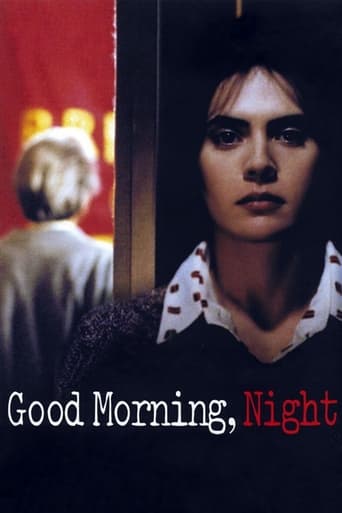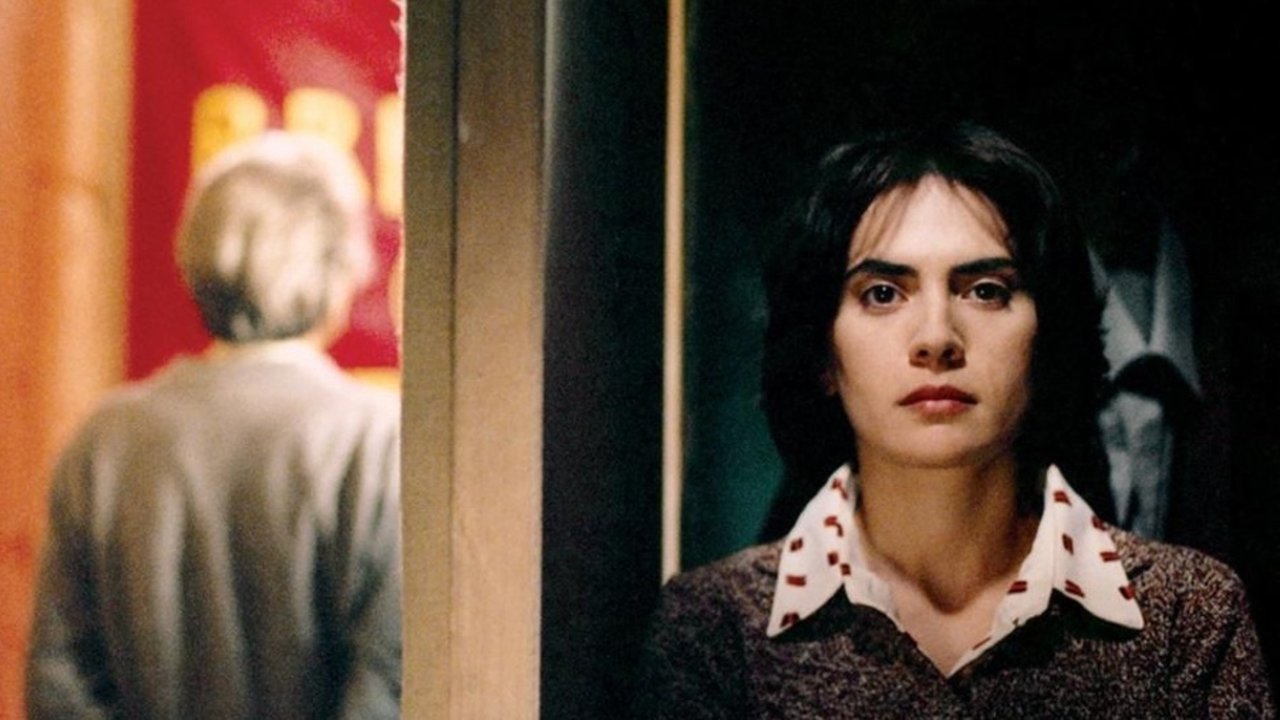paul2001sw-1
In the 1970s, moderate Christian Democrat leader Aldo Moro proposed a historic compromise with the Communist party, whereupon more radical leftists abducted, imprisoned and ultimately killed him. Aside from the personal tragedy, one can wonder if Italy lost the chance of a better future. But how can a group of supposed idealists kill an essentially innocent man, and moreover, one of the more decent politicians of his age? Only, we learn, by abstracting away from humanity. Director Marco Bellocchio was himself once involved in radical politics, enough to understand; and his film about the Moro kidnapping is austere, showing not telling the bleak lives of the captives and captors alike. The soundtrack is heavier than it needs to be, and there's not a lot to soften the mood, nor even lengthy political discussions: the decision to kill is taken, and what follows, follows. Pschologically, the film seems on the mark; but it might have been more interesting with a bit more back story and context.
runamokprods
The true story of the kidnap of Italian political leader Aldo Moro by the Red Brigades in 1978 is turned into a haunting, disturbing tone poem of s film. Eschewing realism, or the obvious tense, linear approach, this focuses on the experience through the eyes of one the young kidnappers, and her ever growing doubts about the righteousness of the mission. But rather than express this literally, we see it emerge in dream sequences, and behind her eyes. Beautifully shot, with a terrific use of classical and modern music (Pink Floyd shows up more than once) this quiet nightmare of a film is far more effecting and thought provoking than most political dramas. It does not miss the irony that Aldo was a humanist who was actually inviting the communist party to be part of the government. A great cautionary truth based fable about the danger of giving yourself completely and unquestioningly to any ideology, left or right, religious or secular.
flywithabel
Marco Bellochio's Good Morning, Night is the story of four Red Brigadiers who kidnap and murder Aldo Moro, Italian Prime Minister and a leader in the Christian Democratic Party. Bellochio's main focus in the movie is the portrayal of lack of reality displayed by the Red Brigade members. This disillusionment is drawn out through the character Chiara, comparisons between the old and new, and the interviews with Aldo Moro while in captivity. The character, Chiara, is a most interesting one. She seems to be the only one of the Brigadiers who has any sense of reality or common sense. A librarian by trade and familial at home, Chiara is constantly confused towards the times and her involvement with the Red Brigade. This confusion is clearly depicted in her conversation with Enzo in the library as he correctly describes her in his screenplay. During this conversation, Enzo tells her that murder scares him yet if murder did not happen, the kidnapping would be meaningless but Chiara's seems to not comprehend this right away. They also engage in talk about reality vs imagination. She claims that imagination (concerning the screenplay) does nothing but the reality is that the screenplay is the truth. Confusion further sets in her mind. She even questions the murder with her comrades. Although she never changes in the movie, Bellochio uses Chiara to depict the confusion between reality and fantasy possessed by most Red Brigade members. Bellochio also uses comparison between the old and new to depict the lack of reality of the Brigadiers. The lunch and song scene with Chiara's family and the conversation amongst the youth is the ultimate exploration of this topic. Fischia il Vento, the song sung by the older family members is an adaptation of a Russian WWII folk song called Katyusha. The song was sung by many partisan groups in the Italian resistance movement who fought during WWII against the fascist governments in Italy and Germany who committed atrocious war crimes. Many of the older people sitting around the table were members of the WWII movement. Bellochio contrasts this older resistance, with moral and sensible goals, with the Brigadiers goals. From the conversation just before the song and during the whole movie, Bellochio implies that the Brigadiers just did not use their complete potential towards a moral cause. Finally, conversations between Aldo Moro and the Brigadiers are great executions of the theme, reality vs fantasy. Moro is the level headed mediator who is more in touch with reality than just about every character in the story. And his detainees are completely in touch with fictitious notions. In Moro's final pleas, he tells the Brigadiers that he will only become a martyr and that his death will not be beneficial to their cause. Moro even tries to explain to them that they both are working towards the same goals: peace and better lifestyle for the working class. The Red Brigadiers disillusionment is further amplified as the trial is claimed to be between the Christian Democratic Party and the Proletariats, whom the Brigadiers claim to represent. None of Moro's reasonable arguments work with the Brigadiers as he is tried and executed. Concluding, disillusionment is Bellochio's greatest implication towards this vicious act of brutality. He concerns himself with showing the viewers through Chiara, an older sense of morality and conversations, that the Red Brigade were just youth who did not understand that they live in such a strange world of hypocrisy.
atorri
This movie describes the 55 days of captivity of On. Aldo Moro, kidnapped by the Red Brigades in 1978. In rapid strokes, the Red Brigades are presented as a group bent on implementing a Marxist-Leninist revolution in Italy through the destabilization of the Republican democratic state in order to implement a Soviet style dictatorship. The Red Brigades were inspired by the Russian revolution and by the actions of Lenin and his Bolshevik followers. The maxim at the time was "Portare l'attacco al cuore dello stato", i.e. "Bring the attack to the heart of the state" and the Red Brigades extended their campaign of numerous targeted assassinations to those public figures that were trying to dilute the original message of the Marxist-Leninist revolution. On. Aldo Moro, President of the Christian Democratic Party, with his decade of attempts to mediate "Il Compromesso Storico" (The Historic Compromise), i.e., the entrance in the Government of politicians of the Italian Communist Party (Partito Comunista Italiano, PCI), was targeted, kidnapped and assassinated because he was close to succeed in his task. In the Red Brigade's view, the entrance of the PCI in the Government would have betrayed the Leninist dogma of proletarian revolution, and of the planned physical elimination of the middle class (Classe Borghese). Mr. Bellocchio does not delve too deeply into this essential motivations of the Red Brigades, and while he does not embellish their crime, he presents a superficial view of the political debate. I was in Italy when On. Moro was kidnapped and assassinated, and I remember very well those days. The Italian Communist Party (PCI) was very worried that the equation Communism-by-the-book = Red Brigades would cause a loss of votes for the party (30-35% of the electorate voted PCI) and the Italian Right (non-fascist) was too sleepy or ignorant to use the equation in the political debate, i.e. to suggest that communism was a bloody ideology that had at its core the destruction in a blood-bath of all the class enemies. Mr. Bellocchio does not present this political debate and prefers to continue the traditional and superficial approach: the Red Brigades were somewhat romantic criminal assassins. The film would have greatly improved had the most recent development on the significance of Communist Terrorism (especially the magisterial work of Richard Drake on the subject) in the 1960's and 1970's Italy been presented. Because it failed to refresh the trite and regimented view that the Red Brigades were a sort of political criminal folly, Mr. Bellocchio should be commended only because he is the only major movie director daring to dedicate a movie to the still not closed chapter of Marxist-Leninist terrorism in Italy. The movie was produced by the Italian State Television (RAI), and many of the RAI intellectuals are lefties: therefore it is not surprising that the fundamental violence of communism in all its forms had not been presented by the movie. In summary: commendable for reconstructing a painful chapter in the history of the Italian Democracy and for presenting a credible On.Aldo Moro, but missing the most updated debate on the subject and not adding much to the popular mythology.


 AD
AD


